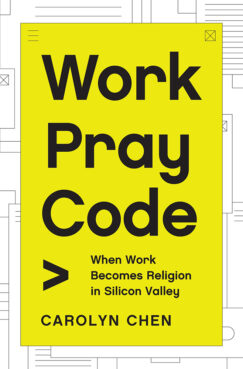(RNS) — Americans have been abandoning religion for a long time. But much like the scientific principle that matter, though it changes forms, never disappears, so too, the religious impulse never quite goes away.
Carolyn Chen identifies where that religious impulse has reemerged — at work. In her new book, “Work Pray Code: When Work Becomes Religion in Silicon Valley,” she examines how high-skilled workers have disinvested from organized religion and are instead finding belonging, identity, purpose and transcendence at the office.
Chen, a sociologist and professor of ethnic studies at the University of California, Berkeley, spent five years interviewing tech workers at Google, Facebook and smaller startups to learn how and why they decided to give their undivided loyalty to the companies where they work.
She also interviewed managers who have invested in the health and spiritual well-being of their employees in an effort to boost productivity. In addition to meditation and mindfulness practices, many of these Silicon Valley firms offer executive coaching and a raft of services such as gourmet cafeterias, gyms, swimming pools, woodworking studios and video game rooms. At one company, she even found an outdoor walking labyrinth, like the medieval spiritual mazes of ancient European cathedrals.
RELATED: Why are people calling Bitcoin a religion?
One downside to tech’s embrace of wholeness and wellness is that it has forced many religious practitioners, especially Buddhists hired by these companies, to downplay the religious origins and traditions of their faith to make it palatable to a nonreligious workplace. Chen calls this a “whitened Buddhism,” stripped of its Asian origins and ethical teachings and minus its rituals of bowing, chanting and burning incense. Instead, many of these practitioners must emphasize the scientific evidence for mindfulness, which, she points out, is often inflated or circumstantial.
The larger problem with worshipping work is that it sucks up employees’ interest and energy in any kind of civic engagement in neighborhoods, cities, local and national politics. “Techtopia,” she writes, “is corroding the collective capacity to build and sustain the common good.”

Author Carolyn Chen. Courtesy photo
Religion News Service spoke to Chen about her book and whether worshipping work has changed in the wake of the coronavirus pandemic. The following interview was edited for length and clarity.
How did you get into this project?
My frustration being a scholar of religion in the Bay Area is that there’s a significant number of people who don’t identify as religious. How do you study them? I was interested in the presence of religion in secular spaces. I started looking at yoga studios because these are secular spaces with religious icons. In interviewing yoga practitioners the theme of work kept coming up: ‘I practice yoga and it helps me become a better teacher, lawyer, nurse.’ It became clear there was something going on. The thing that was sacred in their life was work. They were using yoga to support their work or relieve the stress of work. That’s when I thought, maybe I’m looking in the wrong place and I began to look at workplaces.
What is it about high-tech work that makes it so important to people? Is it the prospect of wealth or economic security or being the next Steve Jobs?
In the tech industry or the startup, there’s a high chance of failure. Nine out of 10 startups fail. So you go for broke. You invest your entire self into it. Someone told me, ‘Why the hell would I do this, if I didn’t think I’d be 1 out of 10 to succeed?’ That kind of intense gamble you’re making requires a kind of faith. It’s a spiritual fervor toward work.
You finished your research in 2019. How have things changed now that people are working from home? Has the Great Resignation affected Big Tech?

“Work Pray Code: When Work Becomes Religion in Silicon Valley” by Carolyn Chen. Courtesy image
The companies are still caring for their employees and still practice a kind of corporate maternalism. They mail home snacks, they offer book clubs through Zoom, mindfulness meditation, executive coaching, therapy. These amenities are continuing. Work has become more demanding, if anything, because there’s no commute. But work doesn’t offer the same social and spiritual benefits you could get before. You’re not able to have lunch with your friends or do crafts with your friends or play video games with your friends. It also doesn’t offer the same spiritual benefits. That, on top of more hours, leads to burnout.
But the majority of workers who are quitting as part of the Great Resignation tend to be lower-skilled service workers. I’m really doubtful the place of work will change for high-skilled workers. This trend in people worshipping work is 40 years in the making. People have disinvested from social institutions, churches, synagogues, neighborhoods, schools, civic associations. You need to rebuild new institutions where you can find meaning, fulfillment and community.
You write a lot about the ambient Buddhism of the Bay Area. It’s a Buddhism stripped of its history, culture and rituals, even language. That’s been successful for these companies but at what cost to religion?
In Silicon Valley, Buddhist virtues, what are called “wholesome states,” are seen as work skills, means to an end. Compassion and empathy, which we might consider to be a virtue or a good in and of itself, becomes a way of making better product design or being more empathetic to consumers. Meditation teachers who taught in school or prisons found it wasn’t financially tenable anymore. The only way they can do it is to bring it to the Googles and Facebooks and LinkedIns. But in the process of doing that, they have to secularize the teachings to make it fit the goals of the workplace. They have to teach it as a productivity practice. It actually changes the religious experience itself. That’s bottom-line Buddhism. It has to change to be profitable. Or they have to remove the ethical teachings from Buddhism because they were not hired to teach about ethics or tell companies how to run more ethically. They were hired to make employees more productive.
Do these companies also have Christian or Jewish offerings for employees?
These are called employee resource groups. They’re like clubs organized by the employees themselves. You might have a Christian organization alongside the Chinese American Association or the knitting club. I talked to pastors who also face the same problem there. Churches draw from people of different walks of life. In the tech workplace, it only draws from an elite group of workers.
How should religious leaders respond to this worship of work?
They could help by naming what they are offering — alternative and life-giving traditions and spaces for people to create lives, communities, meaning and fulfillment outside of work. What I’ve seen instead is that religions have simply accepted this and are finding a way to accommodate it. Some Christians are trying to figure out how to affirm the meaningfulness of work. There’s a danger to that. The first mention of work in the Bible is essentially a punishment. There’s no inherent goodness in work. There’s this striving to accommodate this. But when faith communities don’t name secular dangers, they’re totally missing the boat. There’s this other thing people are worshipping that they don’t see.
RELATED: Meet the student-turned-model who is putting AI to good use with her Robo Rabbi